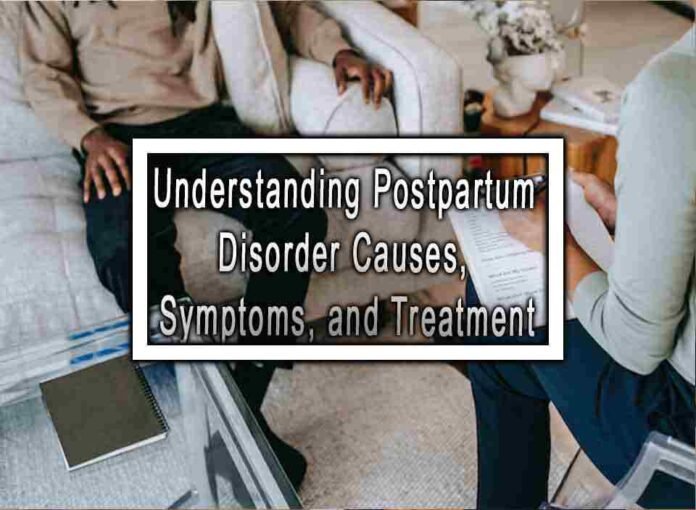Postpartum disorder, also known as postpartum depression (PPD) or postnatal depression, is a mood disorder that affects some women after childbirth. It is important to understand its causes, symptoms, and available treatments. Here’s an overview:
Causes
1. Hormonal Changes
Rapid hormonal fluctuations after childbirth can contribute to postpartum disorder.
2. Emotional and Physical Stress
The demands of caring for a newborn, lack of sleep, and adjusting to new responsibilities can be overwhelming.
3. Personal or Family History
A personal or family history of depression, anxiety, or mood disorders increases the risk.
4. Lack of Social Support
Limited social support or a lack of strong social networks can contribute to feelings of isolation and vulnerability.
Symptoms
1. Persistent Sadness or Low Mood
Feeling sad, down, or experiencing a persistent low mood most of the day, nearly every day.
2. Loss of Interest or Pleasure
Diminished interest or pleasure in previously enjoyable activities.
3. Fatigue and Lack of Energy
Feeling tired or lacking energy, even with adequate rest.
4. Changes in Appetite
Significant changes in appetite, either increased or decreased.
5. Sleep Disturbances
Insomnia or excessive sleep, unrelated to the newborn’s sleep patterns.
6. Intense Feelings of Guilt, Worthlessness, or Hopelessness
Excessive self-blame, feelings of inadequacy, or thoughts of harming oneself or the baby.
7. Difficulty Bonding with the Baby
Struggling to form a strong emotional attachment or feeling disconnected from the baby.
8. Irritability or Agitation
Unexplained irritability, restlessness, or heightened sensitivity.
9. Difficulty Concentrating or Making Decisions
Problems with memory, focus, and decision-making abilities.
10. Physical Symptoms
Physical discomforts such as headaches, stomachaches, or muscle pain without a clear medical cause.
Treatment
1. Therapy
Psychotherapy, such as cognitive-behavioral therapy (CBT), can help individuals identify negative thought patterns, develop coping strategies, and manage symptoms.
2. Medication
Antidepressant medication may be prescribed to help regulate mood and alleviate symptoms. Consult with a healthcare professional for an accurate diagnosis and appropriate medication, if necessary.
3. Support Groups
Participating in support groups or seeking peer support can provide a sense of community and understanding.
4. Lifestyle Modifications
Encourage self-care practices such as regular exercise, healthy eating, sufficient sleep, and stress reduction techniques.
5. Social Support
Encourage open communication with loved ones and seek support from family, friends, and healthcare professionals.
6. Involvement of Partner and Family
Partners and family members can offer emotional support, help with daily tasks, and share parenting responsibilities to alleviate some of the burden.
7. Close Monitoring and Follow-up
Regular check-ins with healthcare professionals are crucial to monitor progress and ensure appropriate treatment.
If you or someone you know is experiencing symptoms of postpartum disorder, it is important to seek help from a healthcare professional. With proper support and treatment, individuals can recover and navigate through this challenging period.












